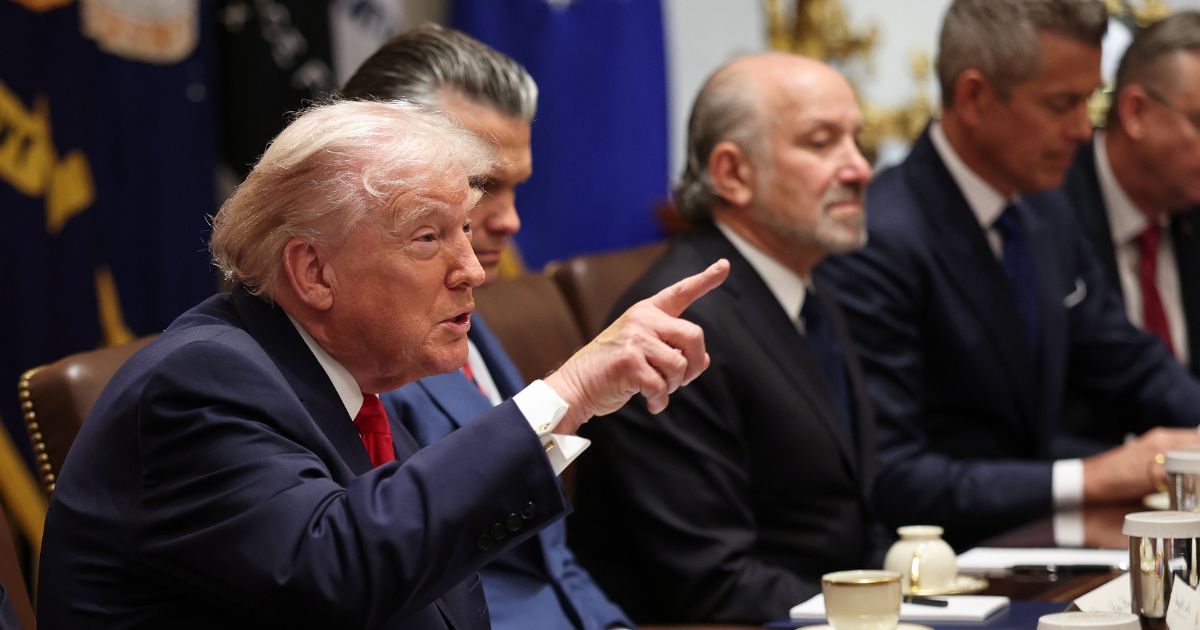Trump administration Intel proposal criticized as ‘socialism’ by conservatives
The article discusses former President Donald Trump’s proposal for the federal government to acquire a 10% ownership stake in Intel, a leading U.S.semiconductor company.This idea, confirmed by the white House, is intended to secure critical semiconductor production domestically, reduce reliance on foreign supplies (especially from Taiwan), and ensure taxpayer value given Intel’s receipt of government grants under the bipartisan CHIPS and Science Act.
However, the proposal has sparked important criticism from conservatives and free-market advocates who view it as a form of socialism or unwanted government intervention in the private sector. Critics argue that such partial nationalization could set a dangerous precedent, leading to increased government control over private companies. They also express concern about the government’s ability to effectively manage business interests and warn of potential long-term consequences after Trump’s presidency.
Supporters within the management and some lawmakers emphasize national security interests and economic benefits, highlighting efforts to reshore manufacturing and strengthen domestic supply chains for semiconductors.The debate reflects broader tensions over government involvement in industry and differing views on the best approach to ensuring U.S. economic and security goals.
Trump administration Intel proposal criticized as ‘socialism’ by conservatives
President Donald Trump’s flirtation with the idea of the federal government acquiring a 10% stake in the United States computer design and manufacturing company Intel has rankled conservatives.
The acquisition would represent one of the largest stakes in Intel, one of only a couple of U.S. companies with the capacity to produce critical semiconductors. However, conservative critics are concerned that it could result in “a slippery slope” for Trump to partly nationalize other companies, with speculation that companies that received the same government grant as Intel could come under similar pressure.
“We hate this idea,” Tim Doescher, executive director of conservative non-profit organization Committee of Unleashing Prosperity, told the Washington Examiner. “If you want to turn Intel into the air traffic control system or Amtrak, this is the perfect way to do that. But of course, we don’t want to do that for Intel.”
The idea regarding Intel, confirmed by the White House on Tuesday, comes after Trump announced in June that Japan’s Nippon Steel would be permitted to purchase U.S. Steel for $14.9 billion, but that the federal government could nominate a board member and retain a non-economic “golden share.”
“Trump may be able to run his businesses well, and he might think he can run these businesses well, and that’s fine,” Doescher said. “But one, what if he can’t? That’s not good. But two, what happens when he’s gone in three years? That’s what really scares me.”
Sen. Rand Paul (R-KY) and conservative commentator Erick Erickson have also expressed concerns about the Intel idea, describing it as “socialism.”
“If socialism is government owning the means of production, wouldn’t the government owning part of Intel be a step toward socialism?” Paul wrote on social media.
“This is socialism with an R next to its name,” Ericson added on his radio show, referring to “Republican.”
Unleashing Prosperity’s Doescher implored Trump to stop “propping” companies “up,” as Democratic and Republican presidents have done in the past for the bank and auto industries.
“I think the American people understand that helping ensure that things are made in America by cutting taxes, by reducing regulation, by making better trade deals, that’s all well and good,” he said. “But when you start taking 10% of a private company, that’s a line that I don’t think we are ready to cross.”
Acting Heritage Foundation economic policy studies director Richard Stern acknowledged Trump’s national security and taxpayer value arguments, but argued the president could rely on export controls instead and that grant income is taxable.
“Having Intel essentially have to give up the value of the grants as an equity stake transferred to the federal government is not the right move for sure and, I think, is a slippery slope,” Stern told the Washington Examiner. “The federal government is bad at managing everything.”
Stern differentiated the Intel idea from previous forms of federal government nationalization, from former President Harry Truman’s takeover of the country’s railroad system and presidential evocations of the Defense Production Act to government-sponsored enterprises, including Fannie Mae and Freddie Mac, which Congress charters.
“It’s not that we’re giving Intel free money, but if we’re giving Intel money to do a service, to beef up domestic chip production, to service a national security issue, then why should that money be handed to them in a manner that’s different from literally any other defense contract in U.S. history?” he asked.
Cato Institute economic and fiscal policy analyst Tad DeHaven criticized the Intel idea too, underscoring that the U.S. is “not China”, so “why would we emulate or want to emulate” the Chinese Communist Party’s nationalization.
DeHaven, a former deputy director of the Indiana Office of Management and Budget and U.S. Senate policy adviser, similarly scrutinized Trump for “[bullying] and [pressuring] everybody and everything, from individuals to law firms to media companies to other countries.”
“He was badgering Intel a couple weeks ago about how their CEO should be canned, and voila, a couple weeks later, now we’re talking about the federal government having an ownership stake,” DeHaven told the Washington Examiner. “And Howie Lutnick has the gall to go on CNBC and say that the government won’t be controlling anything. Yeah, right.”
American Enterprise Institute economic senior fellow Desmond Lachman agreed that the Intel idea is the latest example of Trump’s interventionist, not economically efficient, approach to the economy, which was earlier demonstrated through his tariffs and his call for Coca-Cola to replace corn syrup with real sugar in its recipe.
“If this thing were done in isolation, perhaps you could make an argument for it. But when it’s done when he’s calling all these CEOs into the office and telling them what to do, into the White House, and you’re then threatening them that if they don’t do this, they’re going to be faced with penalties or he’s not going to give them licenses, I just find it scary,” Lachman told the Washington Examiner. “This isn’t the way that the economy should be run.”
“He’s operating like these private equity firms coming and you’re going to turn it around,” the former Salomon Smith Barney managing director continued. “What does he know about it? Trump’s record of running his own companies hasn’t been stellar. You know that a few of them have gone bankrupt.”
Regardless, Trump is advantaged by his reputation for being a dealmaker, underpinned by his book The Art of the Deal, and general trust in his economic management. Though his economic approval has decreased since his inauguration, it was net negative 12 percentage points, 43% approve—55% disapprove, on Wednesday, according to RealClearPolitics.
Cato Institute’s DeHaven conceded “the average person” may not care or understand what Trump is considering related to the Intel idea and may even be “more likely to like something Trump’s doing.”
“What’s really changed with the GOP under Trump is that they at least used to talk about free markets, and limited government, and cutting spending, and all these sorts of things,” he said. “If they lose that trust with regard to prices in the economy, things like partial nationalization and buying stakes in Intel, it could be something that if things head south, it gets added to the whole ball of wax.”
Treasury Secretary Scott Bessent and Commerce Secretary Howard Lutnick confirmed reports on Tuesday that Trump was interested in acquiring a stake in Intel after urging the company to fire its new CEO, Lip-Bu Tan.
“We need to make our own chips here. We cannot rely on Taiwan, which is 9,500 miles away from us and only 80 miles from China,” Luttnick told CNBC. “It would be lovely to have Intel be capable of making a U.S. node or a U.S. transistor, you know, driving that in America.”
Lutnick portrayed the acquisition as being in exchange for grants Intel received as part of former President Joe Biden’s bipartisan CHIPS and Science Act, which provided $280 billion in new funding for domestic semiconductor research and manufacturing, in addition to tax incentives.
“America should get the benefit of the bargain,” he said. “That is exactly Donald Trump’s perspective, which is why are we giving a company worth $100 billion this kind of money? What is in it for the American taxpayer? And the answer Donald Trump has is we should get an equity stake for our money.”
During Tuesday’s briefing, White House press secretary Karoline Leavitt categorized it as “a creative idea that has never been done before to ensure that we’re both reassuring these critical supply chains while also gaining something of it for the American taxpayer.”
“The president, he’s been very clear about the need to reshore manufacturing that’s critical to our national and economic security,” Leavitt told reporters. “That is especially in regards to chips and semiconductors, which is why the president has initiated the Commerce Department to conduct a study on semiconductors, a Section 232 investigation, so we can ultimately implement tariffs, and it’s why our export license requirements remain in place as well.”
Sen. Todd Young (R-IN), a CHIPS and Science Act co-sponsor, defended the legislation, which passed the Senate in 2022 with the support of 17 Republicans and the House with only one.
DEMOCRATS TURN SCREWS ON REPUBLICANS OVER ECONOMY DESPITE VOTER DISTRUST
Young told the Washington Examiner, “The CHIPS and Science Act made possible the economic and national security goal of having a more robust and diversified domestic semiconductor industry.”
“An important part of fulfilling that goal has always been to have at least one viable American player as part of that supply chain to ensure the United States isn’t entirely reliant on foreign entities, and I am encouraged that the Trump administration continues to explore ways to do that,” he said. “It is important to remember that the $52 billion in incentives authorized under the law has already unlocked over $450 billion in private sector investment commitments – which qualifies as more than a good return on taxpayer investment in my estimation.”
" Conservative News Daily does not always share or support the views and opinions expressed here; they are just those of the writer."



